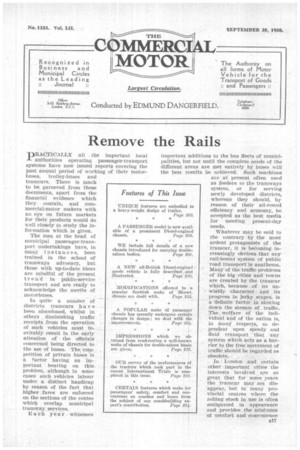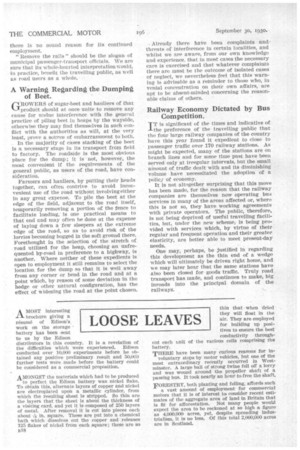Remove the Rails
Page 43

Page 44

If you've noticed an error in this article please click here to report it so we can fix it.
DRACTICALLY all the important local authorities operating passenger-transport systems have now issued reports covering the past annual period of working of their motorbuses, trolley-buses and tramcars. There is much to be garnered from these documents, apart from the financial evidence which they contain, and commercial-motor makers with an eye on future markets for their products would do well closely to study the information which is given.
The Men at the head of munidipal passenger-trans port undertakings have, in many i n .s tan c e s, been trained in the school of tramways advocacy, but those with up-to-date ideas are mindful of the present tr end in public-service transport and are ready to acknowledge the merits of motorbuses.
In quite a number of districts tramcars ha v e . • been abandoned, whilst in , others diminishing traffic ' receipts from the operation of such vehicles must in, evitably result in the early attention of the officials • concerned being directed tO the use of buses. The, com petition of private buses is a factor having an int-. portant bearing on this.
problem, although in some cases• such vehicles labour under a distinct handicap by reason of the fact that higher .fares are enforced on the sections of the routes which overlap municipal tramway services.
Each year witnesses important additions to the bus fleets of inunicipanties, but not until the complete needs of the different areas are met entirely by buses will the best results be achieved. Such machines are at present often used as feeders to the tramways system, or for serving newly developed districts, whereas they should, by reason of their all-round efficiency and economy, be accepted as the best media for meeting present-day needs.
Whatever may be said to the contrary by the most ardent protagonists of the tramcar, it is becoming increasingly obvious that any rail-bound system of public road transport' s anathema.
• Many of the trafficproblems of the bigcities and• towns are created by the tramcar whieh, because . of its un -ch.araoter and its progress in jerky stages, is a.' definite -factor in slowing down the stream of traffic. The , welfare of the indiildual and of the nation is, in many respects, so dependent upon Speedy and fluid transport that any system Which acts as a barrier to the -free-mOyement of traffic shOuld be regarded as obsolete.
In London and, certain other _important cities the interests involved are so great that for some years the tramcar may not dis'appear, but in many provincial centres where the rolling stock in use is often antiquated in appearance and provides, the minimum of comfort and convenience B17 there is no sound .reason for its continued employment.
"Remove the rails" should be the slogan of municipal passenger-transport officials. We are sure that its wholerhearted interpretation would, in practice, benefit the travelling public, as well as road users as a whole.
A Warning Regarding the Dumping of Beet.
'ROWERS of sugar-beet and hauliers of that N--X-produet should at once unite to remove any cause for undue interference with the general practice of piling beet in heaps by the wayside, otherwise they may find themselves in such conflict with the authorities as will, at the very least, prove a source of embarrassment to both.
In the majority of cases stacking of the beet is a necessary stage in its transport from field to factory. The roadside is the most obvious place for the dump ; it is not, however, the most convenient if the requirements of the general public, as users of the road, have consideration.
Farmers and hauliers, by putting their heads together, can often contrive to avoid inconvenient use of the road without involving either in any great expense. To pile the beet at the edge of the field, adjacent to the road itself, temporarily 'removing a portion of the fence to facilitate loading, is one practical means to that end and may often be done at the expense of laying down a few sleepers at the extreme edge of the road, so as to avoid risk of the lorries becoming bogged in the soft ground there. Forethought in the selection of the stretch of road utilized for the heap, choosing an unfrequented by-road in preference to a highway, is another. Where neither of these 'expedients is open to employment it still remains to select the location, for the dump so that it is well away from any corner or bend in the road and at a point which, by reason of some deviation in the hedge or other natural configuration, has the effect of widening the road at the point chosen. Already there haVe been complaints • andthreats of interference in certain localities, and whilst we are aware, from our own knowledge and experience, that in most cases the necessary .care is exercised and that whatever complaints there are must be the outcome of isolated cases of neglect, we nevertheless feel that this warning is advisable as a reminder to those who, in venial concentration on their own affairs, are apt to be absent-minded concerning the reason able claims of others. •
Railway Economy Dictated by Bus• Competition.
IT is significant of the times and indicative of the preference of the travelling public that the four large railway companies of the country have this year found it expedient to close to passenger traffic over 170 railway stations. As might be expected, many of the stations are on branch lines and for some time past have been served only at irregular intervals, but the small ainount of traffic dealt with and its diminishing volume have necessitated the adoption of a polie' of economy.
It is not altogether surprising that this move has been made, for the reason that the railway companies are themselves now operating bus services in many of the areas affected or, where this is not so, they have working agreements with private operators. The public, therefore, is not being deprived of useful travelling facilities, but, under the new scheme, is being provided with services -Which, by virtue of their regular and frequent operation and their greater elasticity, are better able to meet present-day needs.
One may, perhaps, be justified in regarding this development as the thin end of a wedge which will ultimately be driven right home, and we may later hear that the same stations have also been closed for goods traffic. Truly road transport has made, and continues to make, big Inroads into the principal domain of the railways.




















































































































